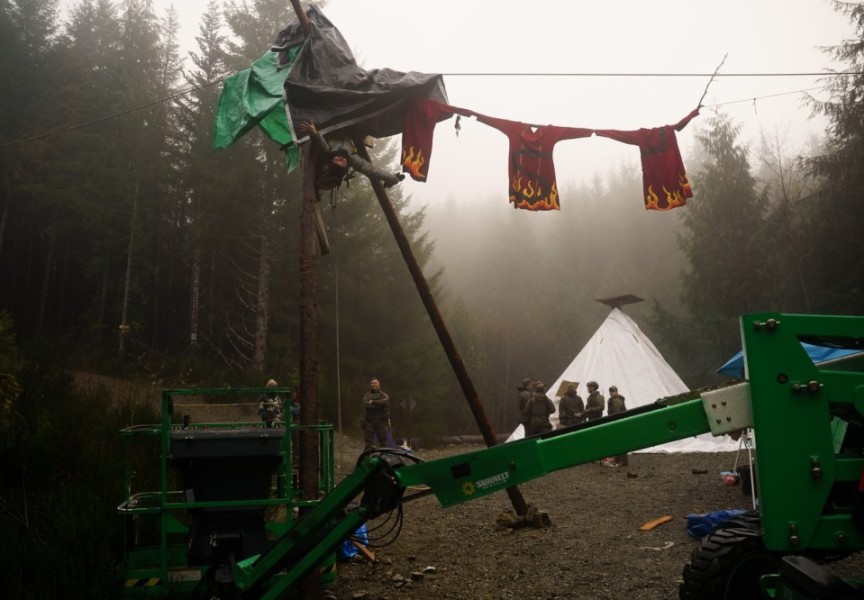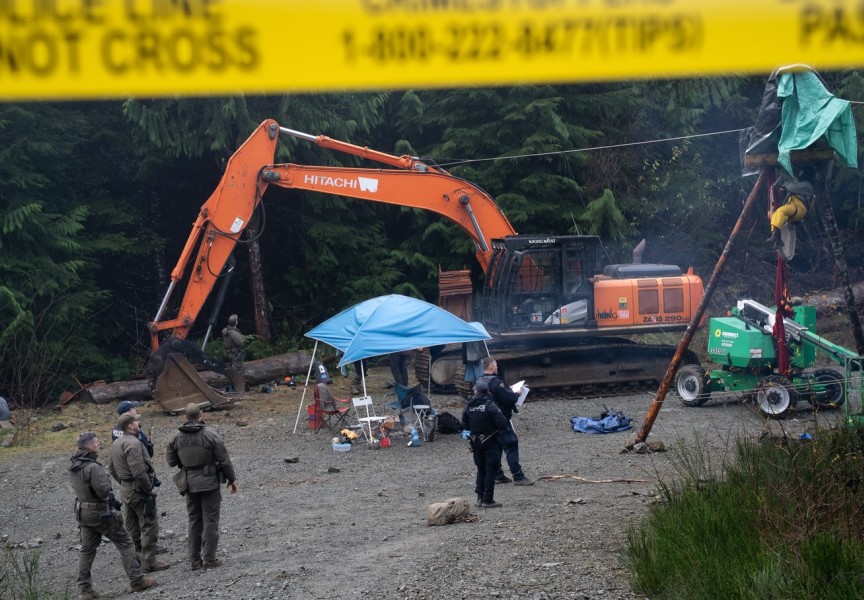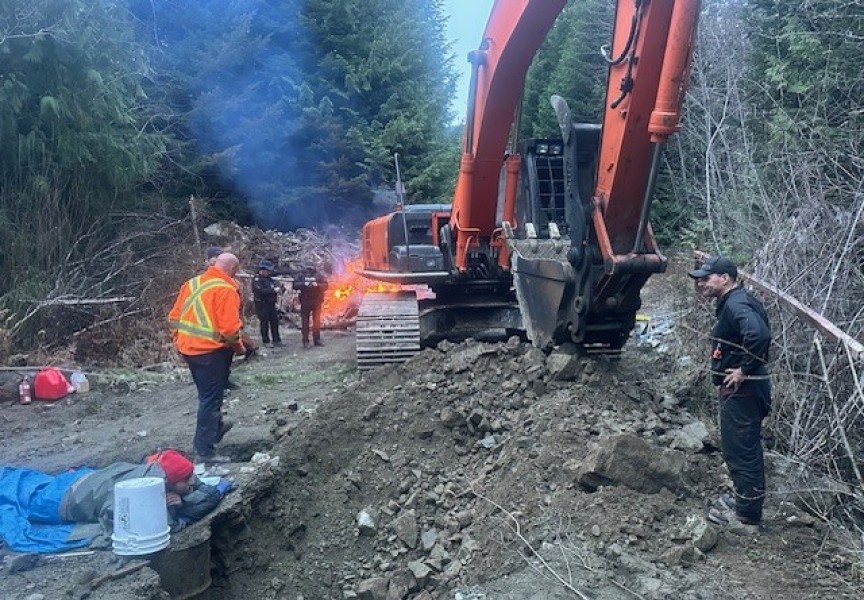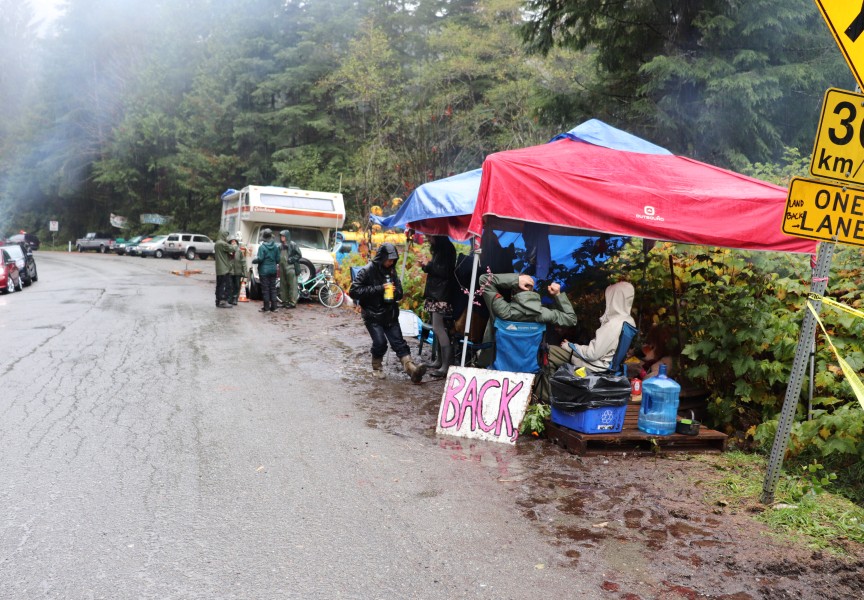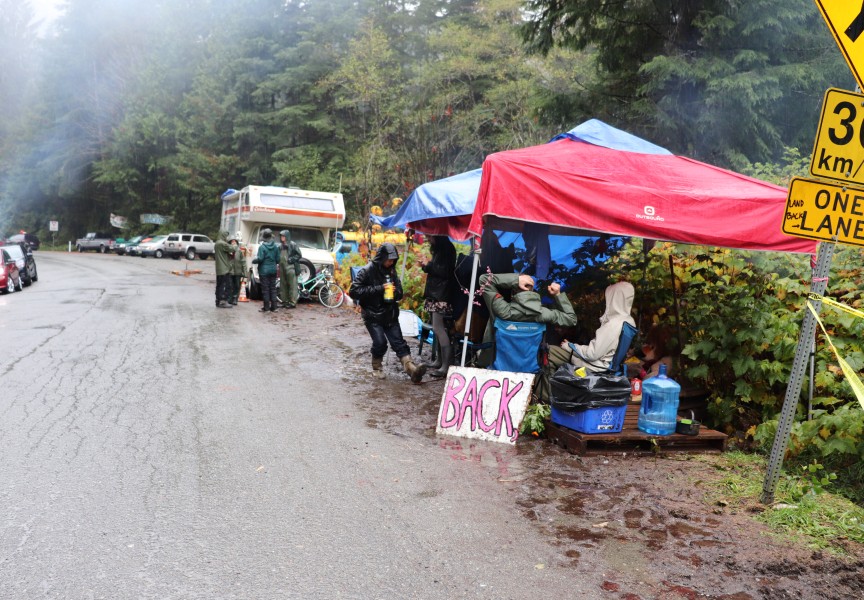After months of peaceful protests calling for an end to old-growth logging near Port Renfrew, tensions between activists and forestry workers have come to a head.
Logging in the Walbran Valley has been paused following the release of a video revealing an altercation between forestry workers and those protesting the harvesting.
The footage was shared by the Rainforest Flying Squad, an old-growth activist group.
Since last summer, they have set-up blockades at the Fairy Creek watershed, as well as elsewhere in Southern Vancouver Island, to prevent Teal-Jones from accessing what is considered one of the last remaining old-growth forests untouched by industrial logging.
In the video, forestry workers yelled racial slurs at the protestors and an altercation ensued. An Indigenous youth was allegedly assaulted.
Kati George-Jim, who's part of the blockade, said “Indigenous peoples are targeted with violence for disrupting industry.”
The forestry staff were working on land managed by Tree Farm License 44 LP, a partnership between Huu-ay-aht First Nations-owned Huumiis Ventures LP (Huumiis) and Western Forest Products Inc (Western).
“TFL 44 LP is moving quickly to take appropriate actions to independently review this incident, determine the facts and act on resulting recommendations,” said Don Demens, Western president and CEO, in a release.
Huumiis and TFL 44 LP issued a joint statement, saying the “use of racist language, intimidation, and acts of violence have no place in our society or our workplaces, and we have zero tolerance for such behaviour. We are fully supportive of the right to peaceful and legal protest and the obligation of all forest companies, including, TFL 44 LP, to provide a safe work environment.”
Huu-ay-aht, Ditidaht and Pacheedaht First Nations met with Western on Thursday, May 6 to discuss the incident.
“The territory where there were intruders belongs to [Hereditary Chief] Queesto of Pacheedaht,” said Huu-ay-aht First Nations Chief Councillor Robert J. Dennis Sr. “And I believe those people should be asking Queesto, ‘can I protest in your land?’”
Historically, Nuu-chah-nulth people participated in canoe journeys, where they would canoe to neighbouring nations’ territories. Upon landing in a new territory, permission to land was required by the hereditary chief, explained Dennis.
“To me, the protestors and those loggers are disrespecting the roles and responsibilities of Queesto,” he said.
In mid-April, a letter signed by Hereditary Chief Frank Queesto Jones and Chief Councillor Jeff Jones stated decisions over forestry resources need to be made by the First Nation, adding that the Pacheedaht has always harvested old-growth trees for various reasons, including economic purposes.
“Our constitutional right to make decisions about forestry resources in our territory, as a governing authority in our territory, must be respected,” reads the statement. “We do not welcome or support unsolicited involvement or interference by others in our territory, including third-party activism.”
On Friday, Huu-ay-aht First Nations announced it will be implementing access restrictions and safety measures within the nation’s territory starting Monday, May 10.
The step is in response to an alleged forestry operations incident that took place on Thursday, May 6.
“Eye-witness accounts confirm a forestry protester drove through safety barriers into an active logging area, putting the safety of the driver and the forestry workers at risk,” read a release issued by Huu-ay-aht First Nation.
“Protesters, forest workers, companies, other governments, or Indigenous or non-Indigenous individuals who do not conduct themselves in accordance with our nation’s three sacred principles – ʔiisaak (Utmost Respect), ʔuuʔałuk (Taking Care of), and Hišuk ma c̕awak (Everything is Connected) – are not welcome in our ḥahuułi (Territory),” said Huu-ay-aht Tayii Ḥaw̓ił ƛiišin (Head Hereditary Chief Derek Peters), in the release.
Prior to Tuesday’s altercation in the Walbran Valley, Huu-ay-aht had been prepping to provide a virtual course, titled “Huu-ay-aht 101” for Western workers.
The course will cover cultural traditions and historical information related Huu-ay-aht, said Dennis.
“A lot of people don't realize that there was a very functioning and well-organized governance structure in place long before white settlers got here,” he said.
Forests minister Katrine Conroy said she is “disgusted” by the racist language used by some of the forestry workers in the video, adding there is “no place for racism, period.”
“How old-growth forests are managed is an emotional and complex issue,” she said. “Our government is committed to doing things differently to protect vital old-growth stands while supporting workers and communities.”
Despite the province’s commitment, recent mapping done by the Wilderness Committee indicates that old-growth logging approvals have gone up by 43 per cent this year, compared to last.
“The government is not keeping its word,” said Torrance Coste, Wilderness Committee campaign director. “We're calling on the government to defer old-growth logging and provide support for communities that currently derive benefits from old-growth … to just say that we need to change the way we're managing old-growth, but not actually change anything on the ground leads these companies to go and get it while they can.”
The Ministry of Forests, Lands, Natural Resource Operations and Rural Development responded by saying it does not feel the Wilderness Committee’s analysis accurately reflects what is happening in B.C.’s old-growth forests.
“The fact is, 10 million hectares of old-growth is already protected and since coming into office our government has protected hundreds of thousands more,” the ministry said in a release. “We are committed to work with the committee to better understand their results and to provide a true account of our old-growth forest.”
Following the altercation, all TFL 44 LP contractors and their crews received a briefing on Wednesday, May 5, covering “the critical importance of adhering to forest operation safety and already-established public protest protocols which focus on respectful non-engagement,” read the joint statement by Huumiis and TFL 44 LP.
As the incident between forestry workers and protestors continues to be investigated, tensions remain high.
“There's a lot of charged emotions on this issue,” said Coste. “But there's no place for violence or intimidation or racism.”
“The loggers broke our laws, and they broke colonial law as well,” said Kati George-Jim in a release issued by the Rainforest Flying Squad. “The fundamental laws of our coastal peoples are based in reciprocity and respect for all relatives, and consensual relationships. We honour all past, present and future generations by protecting the integrity of our shared mother earth.”



